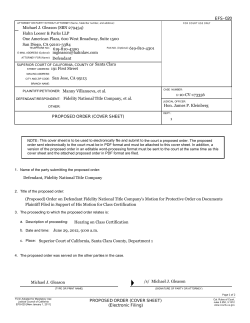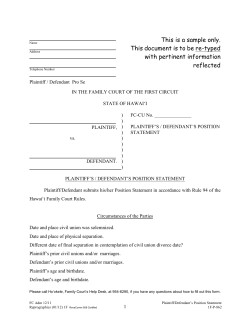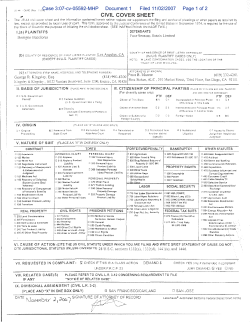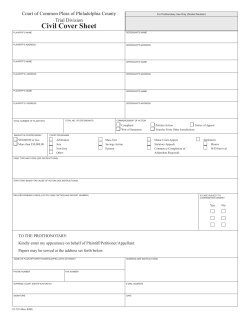
Elizabeth B. Turner v. Selina C. Gaviria
IN THE COURT OF APPEALS OF TENNESSEE AT JACKSON November 14, 2014 Session ELIZABETH B. TURNER v. SELINA C. GAVIRIA Appeal from the Circuit Court for Shelby County No. CT00572511 Robert L. Childers, Judge No. W2014-01087-COA-R3-CV - Filed December17, 2014 This is the second appeal of this case involving enforcement of an oral loan agreement. Appellant appeals the judgment entered against her. Because the appellate record contains no transcript or statement of the evidence pursuant to Tennessee Rule of Appellate Procedure 24, we conclude that the findings made by the trial court in support of its conclusions of law were based upon sufficient evidence. Affirmed and remanded. Tenn. R. App. P. 3 Appeal as of Right; Judgment of the Circuit Court is Affirmed and Remanded K ENNY A RMSTRONG, J., delivered the opinion of the Court, in which A RNOLD B. G OLDIN, J., and B RANDON O. G IBSON, J., joined. Kevin A. Snider, Germantown, Tennessee, for the appellant, Elizabeth B. Turner Fred M. Ridolphi, Jr., Memphis, Tennessee, for the appellee, Selina C. Gaviria OPINION I. Background This is the second appeal of this case, which began in December 2011 when Ms. Elizabeth B. Turner (“Ms. Turner” or “Appellant”) filed a complaint in the Circuit Court of Shelby County against her sister, Defendant Selina C. Gaviria (“Ms. Gaviria” or “Appellee”). Turner v. Gaviria, No. W2013-01944-COA-R3-CV, 2014 WL 426663 at 1 *1 (Tenn. Ct. App. Feb. 3, 2014) (“Turner I”).1 In the interest of judicial economy, we restate the facts of the underlying case as they appeared in Turner I. In her complaint, Ms. Turner alleged that, “many years ago,” she agreed to loan Ms. Gaviria $64,000 to be used as a down payment on a home and for in vitro fertilization procedures. She asserted that, although the agreement was not reduced to writing, Ms. Gaviria made payments on the loan until April 2001. Ms. Turner further asserted that Ms. Gaviria “unilaterally executed a document” offering to pay Ms. Turner a total of $32,000 at the rate of $100 per month for three years, and $300 per month thereafter for seven years, to commence when Ms. Gaviria's anticipated divorce became final. Ms. Turner further asserted that Ms. Gaviria's husband made essentially the same offer, and that she neither accepted nor agreed to their offers. Ms. Turner asserted that $35,000 remained due on the loan; that, on October 10, 2011, her legal counsel sent Ms. Gaviria written demand for payment in the amount of $35,000 within 20 days; and that Ms. Gaviria had refused to pay the balance owed. She asserted claims for breach of contract and unjust enrichment and prayed for compensatory damages in the amount of $50,000, reasonable attorney's fees, prejudgment interest, and costs. Ms. Gaviria answered in March 2012. In her answer, Ms. Gaviria admitted that “monies were delivered to her” by Ms. Turner, asserted that she had repaid Ms. Turner in full “in the event there was a legal obligation to do so on her part [,]” and denied any obligation for further payments. She asserted six defenses, including unenforceability of the alleged note; that the money was a gift; novation; accord and satisfaction; and the statute of limitations. Following discovery, the trial court heard the matter in June 2013. By order entered June 17, 2013, the trial court entered judgment in favor of Ms. Gaviria, finding her “not liable . . . for any damages” to Ms. Turner. Ms. Turner filed a motion to 1 Turner I is a memorandum opinion under Rule 10 of the Rules of the Court of Appeal of Tennessee. W e are aware that these cases shall not be cited or relied on for any reason in an unrelated case. W e rely on it here only insofar as the facts of the underlying case are the same. 2 alter or amend on June 25, which the trial court denied on August 2, 2013. Id. In Turner I, we determined that the trial court failed to enter written findings of fact and conclusions of law pursuant to Tennessee Rule of Civil Procedure 52.01. Because this Court could not make a meaningful review of the case in the absence of Rule 52.01 findings, we remanded the case to the trial court for entry of findings of fact and conclusions of law. On May 6, 2014, the trial court issued its findings of fact and conclusions of law in favor of Ms. Gaviria which were later incorporated into the Amended Final Order of Judgment entered on May 21, 2014. Ms. Turner filed a timely notice of appeal from the May 21, 2014 Order. II. Issues Ms. Turner raises two issues for review as restated from her brief: 1. Whether the trial court’s findings of fact and conclusions of law are contrary to the previous findings and rulings and, therefore, require reversal. 2. Whether the trial court’s findings of fact and conclusions of law are not supported by the testimony and evidence presented at trial and, therefore, require reversal. III. Standard of Review We review the trial court's findings of fact de novo upon the record of the trial court, accompanied by a presumption of the correctness of these findings, unless the evidence preponderates otherwise. Tenn. R. App. P. 13(d); Langschmidt v. Langschmidt, 81 S.W.3d 741, 744 (Tenn. 2002). With respect to the trial court's conclusions of law, however, our review is de novo with no presumption of correctness. Ganzevoort v. Russell, 949 S.W.2d 293, 296 (Tenn. 1997). Broadbent v. Broadbent, 211 S.W.3d 216, 219-20 (Tenn. 2006). IV. Analysis As set out in its order, the trial court made the following findings of fact and conclusions of law: 3 FINDINGS OF FACT 1. Defendant admits that Plaintiff gave her $50,000.00 on March 5, 1999 to buy a house. The $50,000 was used by Defendant and her then husband, Marlon David Gaviria, to purchase a house. 2. Defendant also admits that Plaintiff also gave Defendant $14,000.00 to be used for in vitro fertilization. 3. Plaintiff admits that there was no written agreement that Defendant or Defendant’s then husband would repay the $64,000.00 to Plaintiff, and that there was no discussion about repayment terms or a repayment schedule, or payment of interest on the principal. 4. Plaintiff admits that she signed a letter dated March 17, 1999 for Defendant for the purpose of Defendant and her then-husband obtaining a loan for a home they were purchasing. The letter stated that the $50,000.00 that Defendant and her then-husband were using for a down payment on the home was a gift from Plaintiff. This letter was required by the lending institution as a requirement for making the loan for the purchase of the home. The bottom on the letter states: “Warning, Section 1010 of Title 18 USC Federal Housing Administration Transactions provides: ‘Whoever for the purpose of influencing in any way the action of such administration makes, passes, utters or publish (sic) any statement knowing the same to be false shall be fined not more than $5,000 or imprisoned not more than two years or both.’” 5. In 2001 Plaintiff asked Defendant to put the “debt” in writing because Defendant and her then-husband were getting a divorce. 6. Plaintiff suggested that Defendant and her thenhusband both sign promissory notes agreeing to each pay onehalf of the $64,000 “debt” to Plaintiff. 7. Defendant and her then-husband both agreed to repay one-half of the $64,000 “debt” to Plaintiff. The marital dissolution agreement entered into by defendant and her thenhusband reflects that the parties agreed that they each owed the Plaintiff a debt of $64,000 and that husband and wife 4 would be equally responsible for the debt. 8. Trial Exhibit 3 is a promissory note by Defendant and Marlon David Gaviria for $32,000 to be paid at $100 per month for a maximum of three years and then payments of $300 per month thereafter for seven years, beginning when the parties’ divorce was final [sic]. 9. Marlon David Gaviria admits that both he and Defendant each signed promissory notes to Plaintiff and agreed to repay $32,000 each. 10. Marlon David Gaviria and Defendant signed the promissory notes at Plaintiff’s request. 11. Plaintiff admits that the promissory notes for $32,000 each executed by Defendant and Marlon David Gaviria were faxed to her in 2001. 12. Marlon David Gaviria was discharged in Bankruptcy in 2002 after Defendant and Marlon David Gaviria divorced. 13. On or about May 5, 2006 Plaintiff emailed Defendant indicating that “David sent me $100 per month for 36 months for a total of $3,600 . . .” Defendant responded to Plaintiff’s email: I have attached a spreadsheet of all the payments I have made thus far. The amount due to you from me is $6,500. I realize David owes you money and you expect payment from me. I have and will make good on my part of the agreement. However, our agreement with you at the time of the divorce was that David and I would split the debt. I will give you a $6,500 check which is the balance of my part. . . “As you can see from this email I sent, he has agreed to pay you. So I feel like I have met my responsibility as was previously agreed upon by all the parties (at the time of the divorce). . .” Plaintiff did not respond to Defendant’s email or manifest in any other way that she disagreed that there was such an agreement. Plaintiff did not deny that she received Defendant’s response to Plaintiff’s May 5, 2006 email. 14. Plaintiff admits that she received twenty-eight payments from Defendant after April 16, 2001, and that Defendant has paid her $32,000. Plaintiff also admits that she received $3,600 from Marlon David Gaviria. 5 CONCLUSIONS OF LAW 1. $50,000 of the $64,000 was a gift by Plaintiff to Defendant. 2. Assuming, arguendo, that the $50,000 was not a gift, there was a novation, whereby Defendant and Marlon David Gaviria each agreed to pay Plaintiff $32,000. 3. There has been accord and satisfaction of the remaining debt of $14,000 because it is undisputed that Defendant has paid Plaintiff $32,000. 4. The Defendant is not liable to Plaintiff for the debt sought by Plaintiff. Appellant has asked this Court to review the foregoing findings of fact and conclusions of law against the evidence presented at the hearing. However, due to procedural shortcomings in the appellate record, we do not reach the substantive issues. Tennessee Rule of Appellate Procedure 24 outlines the content and preparation of the record; the rule states in pertinent part, as follows: (a) The record on appeal shall consist of: (1) copies, certified by the clerk of the trial court, of all papers filed in the trial court except as hereafter provided; (2) the original of any exhibits filed in the trial court; (3) the transcript or statement of the evidence or proceedings, which shall clearly indicate and identify any exhibits offered in evidence and whether received or rejected…. *** (b) …the appellant shall have prepared a transcript of such part of the evidence or proceedings as is necessary to convey a fair, accurate and complete account of what transpired with respect to those issues on appeal. (emphasis added). The Tennessee Rules of Appellate Procedure place the responsibility for the preparation of the transcript or a statement of evidence on the parties, and the appellant has the primary burden to see that a proper record is prepared and filed in this Court. Tenn. R. App. P. 24; McDonald v. Onoh, 772 S.W.2d 913, 914 (Tenn. Ct. App. 1989). In this case, the record contains no transcript of the hearing, nor is there a statement of the evidence pursuant to Tennessee Rule of Appellate Procedure 24(c). Although there is no transcript of any actual evidence, our record does contain an eleven (11) page excerpt of the June 10, 2013 proceedings, which occurred prior to our decision in Turner I. This excerpt, which is attached as an exhibit to Ms. Turner’s Motion to Amend Final 6 Judgment, contains statements made by the trial court from the bench. It is well settled that a trial court speaks through its orders. Palmer v. Palmer, 562 S.W.2d 833, 837 (Tenn. Ct. App. 1977). “A judgment must be reduced to writing in order to be valid. It is inchoate, and has no force whatever, until it has been reduced to writing and entered on the minutes of the court, and is completely within the power of the judge or Chancellor.” Broadway Motor Co. v. Pub. Fire Ins. Co., 12 Tenn. App. 278, 280 (1930); See also Steppach v. Thomas, 346 S.W.3d 488, 522 (Tenn. Ct. App. 2011) (quoting In re Adoption of E.N.R., 42 S.W.3d 26, 31 (Tenn. 2001)). As we noted in Steppach, we review the trial court's written orders on appeal. Id. Accordingly, this isolated portion of the transcript is not helpful to this Court’s review. We note that on May 30, 2014, Ms. Turner filed a notice and request in the trial court to include the full record on appeal including all transcripts that have been previously filed with the circuit court. Despite Ms. Turner’s notice, there was never a motion filed in this Court to consolidate the records of this appeal with Turner I. The signature of Ms. Turner’s attorney appears on the Appellate Court Clerk’s sign-out sheet certifying that “he has reviewed the exhibits when the exhibits came into his possession and that all the exhibits in this record on appeal are accounted for and in proper order.” However, except for the 11-page excerpt, there are no transcripts or exhibits contained in our appellate record. Tennessee Rule of Appellate Procedure 13(d) directs this Court to review the evidence in the record to determine whether there is material evidence to support the ruling of the trial court. However, without a transcript or statement of the evidence this Court must presume that every fact admissible under the pleadings was found or should have been found in the appellee's favor. Gotten v. Gotten, 748 S.W.2d 430, 432 (Tenn. Ct. App.1987); Richmond v. Richmond, 690 S.W.2d 534, 536 (Tenn. Ct. App.1985); In re Rockwell, 673 S.W.2d 512, 516 (Tenn. Ct. App.1983); and McDonald, 772 S.W.2d at 914. It is well settled that, in the absence of a transcript or statement of the evidence, this Court must presume that there was sufficient evidence before the trial court to support its judgment. PNC Multifamily Capital Inst. Fund XXVI Ltd. P'ship v. Mabry, 402 S.W.3d 654, 661 (Tenn. Ct. App. 2012), perm. app. denied (Tenn. Apr. 10, 2013); Outdoor Management LLC v. Thomas, 249 S.W.3d 368, 377 (Tenn.Ct.App.2007); and McKinney v. Educator and Executive Insurers, Inc., 569 S.W.2d 829, 832 (Tenn.Ct.App.1977). Because there is no transcript or Rule 24 statement of the evidence, the facts found by the trial court, supra, are conclusive on appeal, and we must conclude that there is sufficient evidence in the record to support those findings. Accordingly, we must affirm the judgment. 7 Ms. Turner also raises the issue of whether the trial court’s findings of fact and conclusions of law are contrary to the previous findings and rulings, and therefore, require a reversal. As noted earlier, the only transcript provided in this record is an eleven page excerpt containing statements made by the trial court prior to issuing its ruling on June 10, 2013. As such, these statements are inchoate because they were not incorporated into the court’s order. In Shelby v. Shelby, 696 S.W.2d 360, 361 (Tenn.Ct.App.1985), this Court stated that: “We do not review the court's oral statements, unless incorporated in a decree, but review the court's order and judgments for that is how a Court speaks.” See also Broadway Motor Co. 12 Tenn. App. at 280; Steppach, 346 S.W.3d at 522. Although no presumption of correctness attaches to a trial court’s conclusions on issues of law, Bowden v. Ward, 27 S.W.3d 913, 916 (Tenn. 2000); In re M.L.D., 182 S.W. 3d 890, 894 (Tenn. Ct. App. 2005), the conclusions of law are based on the evidence and facts presented to the trial court. In this case, because no transcript or statement of the evidence is included in the record on appeal, we conclusively presume that the findings of fact made by the trial court are supported by the evidence and are correct. Even if we assume, arguendo, that the trial court’s oral statements are germane to our review, it is apparent from those statements, which appear below, that the trial court distinguished Ms. Gaviria’s moral obligation to her sister from her legal obligation: Morally, there is no question, the Defendant owes the Plaintiff the entire $64,000 as a moral issue. That’s something that I can’t determine here. . . .this is a court of law, and legally, the Court finds that the Defendant does not owe the Plaintiff anything and I will entire [sic] a judgment for the Defendant. In reviewing this excerpt, we do not find the oral statements of the trial court contrary to its written findings of fact and conclusions of law included in the Amended Final Order of Judgment. V. Conclusion For the foregoing reasons, we affirm the judgment of the trial court. The case is remanded for such further proceedings as may be necessary and are consistent with this opinion. Costs of the appeal are assessed against the Appellant, Elizabeth B. Turner, and her surety. _________________________________ KENNY ARMSTRONG, JUDGE 8
© Copyright 2025









